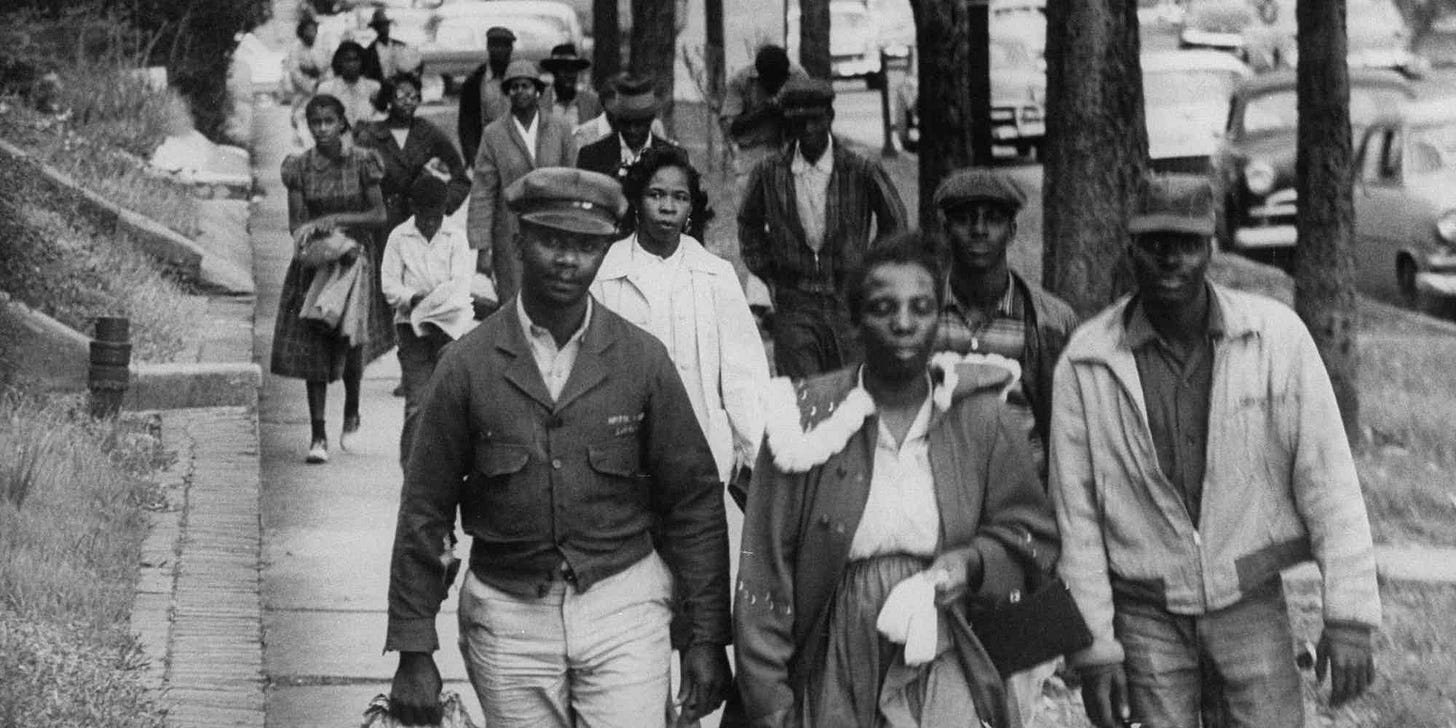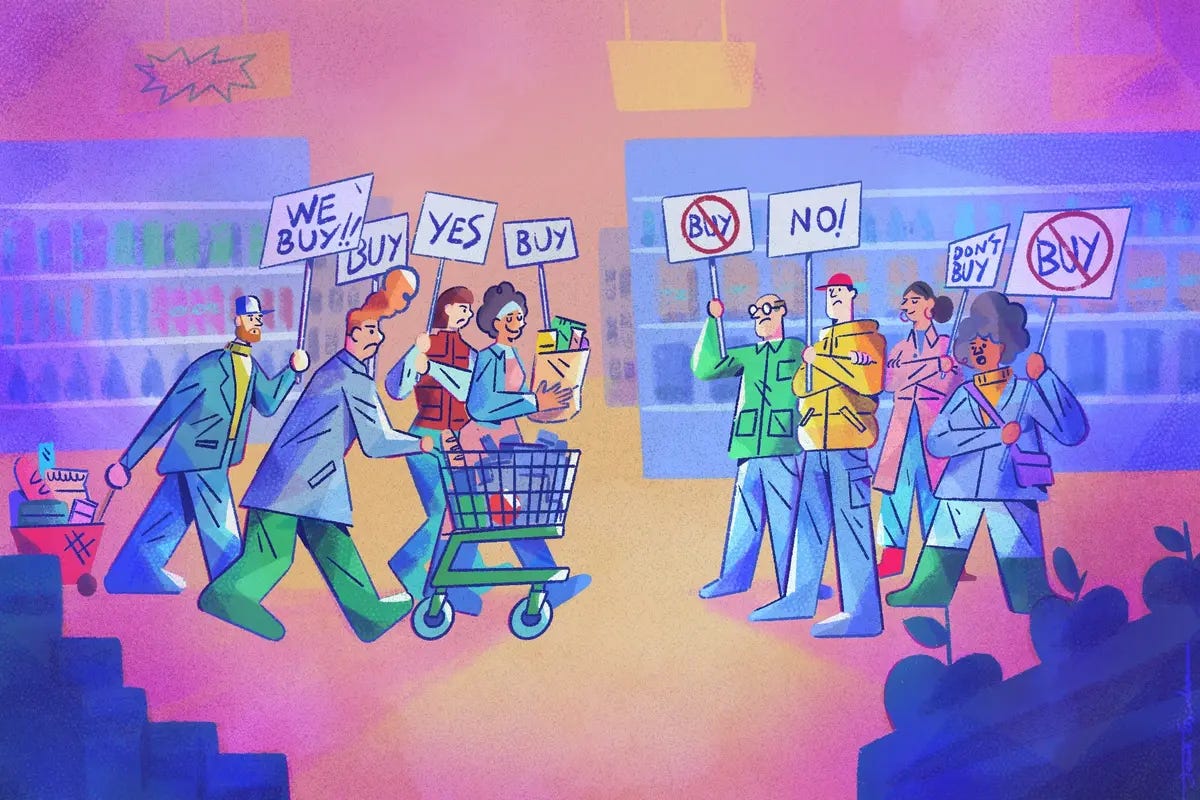Since the election and especially with all the DEI rollbacks, those opposed to this administration and believers of diversity, equity, and inclusion have wanted to economically express their displeasure. But the list of egregious companies is ever growing and too many are our staple stores. We want to boycott effectively but we feel boxed in without an adequate path forward towards our goal of economic impact.
Well in my humble opinion boycotts are not the answer. In this day and age that we live in, we are not going to have the storied success of the Montgomery Bus Boycott (MBB). Our circumstances today are completely different. What made the MBB so successful was four specific factors.
1. The boycott was narrow in scope. While the boycott garnered national attention, the goal was to end racial segregation on public buses.
2. Their lack of patronage would be felt immensely. Black people made up 75% of the ridership.

3. Alternatives were available. The boycott was highly organized with alternate modes of transportation including taxis, privately own automobiles, cycling, walking, etc.
4. Folks were in it for the long haul. The boycott lasted 381 days. It was nearly 13 months before the Supreme Court ruled segregation on public buses to be unconstitutional.
It is pretty clear to see that these four factors are missing from our present-day struggle. The only resistance along these lines that I can think of are labor strikes and last year (2024) brought us a “Hot Labor Summer” with union workers striking across several industries. If only those bargaining agreements were set to expire in 2025. Imagine what a moment that would’ve have been against the backdrop of this administration.
In any case, all across my social media feeds people are grappling with what to do to bring about the change that we seek. Traditional boycott ideas are falling flat because those four factors are missing. Yet anything other than an all out boycott seems to be ineffective and thus pointless.
What to do? What to do?
Well from the title of this post you already know my recommendation is we have to change our mindset completely and spend like we are broke. In other words, buy only what you need. For some people, this will not be hard to do because they already don’t make enough to buy much more than they need and may not even be able to make ends meet. For those more fortunate, it is time to start living well below your means.
Now need is a relative term and I cannot dictate to anyone what is/is not a need. But as you continue reading the rationale for my recommendation, I really hope and pray that you truly evaluate your expenditures and determine a serious minimum that you can live off of.
So why should we spend like we are broke?
There are two core reasons. The first is economic uncertainty is very much on the horizon, if not already here. The chaos and confusion of this administration, along with their policies, do not indicate stability whatsoever. During the campaign, twenty-three Nobel Prize-winning economists supported former Vice President Kamala Harris stating that her opponent’s economic agenda would lead to higher prices, larger deficits, and greater inequality. Now that the new administration has taken over, no economist expects a fantastic economy. His policies are considered to be a “wild card.”
The range of possible economic outcomes is dizzying. Just like we’re supposed to look to see if flight attendants are calm when there is turbulence or some other problem in-flight, we look to economists to know if they are calm about the economy. And just like seeing a flight attendant concerned and moving with urgency makes me think my flight is in trouble, hearing economists use words like uncertainty, cross currents, wild card, and dizzying makes me think our economy is in trouble.
So yeah my confidence as a consumer is shot and if consumer confidence plummets, that does not bode well for the economy. Spending like we are broke signals low consumer confidence and believe me it will be noticed. Which brings me to the second core reason we should spend like we are broke.
In my estimation, our economy is over-reliant on an our high degree of consumerism. Approximately 12% of our GDP is exported to other countries. So we are the primary consumers of our products and services. Our goods and services do not permeate international markets. The inverse however does not ring true. By our own reckoning, the United States is the world’s largest importer of goods totaling $3.2T and the world’s largest importer of services totaling $680.3B.
Which means we do most of the heavy economic lifting with our spending. So much so that I don’t think we are completely aware of our spending habits and to what extent consumerism has taken root in our daily lives. I don’t think we realize the very intentional strategies on the part of advertisers, retailers and tech companies to lower our defenses when it comes to spending. They don’t want us to even pause for the slightest moment to reconsider a purchase. Impulse buying has become the order of the day. In my humble opinion, I believe our high level of consumerism is what makes it difficult to economically express our displeasure with the direction business and political leaders are taking.
We are conflicted about how to move forward because we are not clear about what we are willing to sacrifice, both individually and collectively. We need to reckon with the fact that sacrifices across the board for individuals and business owners will be required. While we want to support the small businesses whose products have made their way into mainstream marketplaces, we need to come to terms with the fact that win-win scenarios are going to be hard to come by in this climate. We need to be honest with ourselves about the fact that we routinely and even as a matter of sport buy way more than we need, propping up an economy that for the foreseeable future is not even will to pretend to care about the consumer.
And it’s time to express our displeasure in terms they truly understand. At the same time get a head start on preparing for the unstable economy that seems to be just around the bend.
Onward with disciplined spending and Harmonious Balance, my friends!
Johanna
**For customized content requests,1:1 coaching and speaking inquiries, feel free to contact me.**





